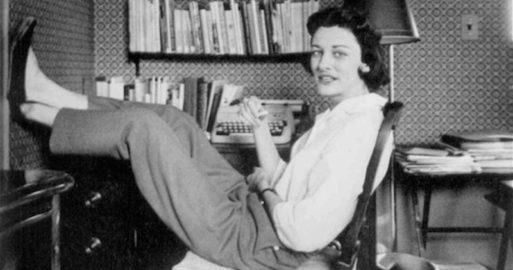 Anne Sexton was a prolific, multiple-award-winning poet, who first began writing as a form of therapeutic release as she struggled with depression. As such, her writing includes some intensely personal, confessional works as well as symbolic themes that delve into the difficult topics of fear, death, and, as with this poem — courage.
Anne Sexton was a prolific, multiple-award-winning poet, who first began writing as a form of therapeutic release as she struggled with depression. As such, her writing includes some intensely personal, confessional works as well as symbolic themes that delve into the difficult topics of fear, death, and, as with this poem — courage.
In “Courage,” Sexton uses four stanzas to represent four different stages in a person’s life — youth, young adulthood, middle age, and old age — and delves into both the conventional and unconventional ways one can show courage. She writes directly to the reader, using the words, “you” and “we,” throughout, which makes her message resonate further. You begin to recall and connect to those powerful and scary moments in your life when you showed courage.
The first stanza, which describes the reader in his or her youth, declares that courage is in the “small things,” such as a child taking its first steps (“as awesome as an earthquake”) and later, learning to ride a bike.
Sexton also addresses the darker, lonelier aspects of courage — such as when one is punished with a spanking (“when your heart went on a journey all alone”) or experiences the cruelty of bullies.
“When they called you crybaby
or poor or fatty or crazy
and made you into an alien,
you drank their acid
and concealed it.”
The next stanza (young adult) describes a soldier at war, which could also very well mean the metaphorical battles one fights. Here, she acknowledges that, although fear exists inside us, we can conquer it over and over again, no matter how minuscule our courage might be.
“You did not fondle the weakness inside you
Though it was there.
Your courage was a small coal
That you kept swallowing.”
Which leads into the third stanza — middle adulthood and an unnamed loss of some kind, a “great despair,” that one had to face alone. And in the loneliness of this grief, you endured, and that, too, is courage.
“Next, my kinsman, you powdered your sorrow,
you gave it a back rub
and then you covered it with a blanket
and after it had slept a while
it woke to the wings of the roses
and was transformed.”
And then we come to her final stanza — old age and “its natural conclusion,” that is, death. She speaks of the courage to live life “in a fever of love,” even while one may “bargain with the calendar.” And then, when death finally comes, Sexton declares to the reader that this is their final act of courage.
“and at the last moment
when death opens the back door
you’ll put on your carpet slippers
and stride out.”
This poem was published posthumously in 1975. As mentioned above, Anne Sexton first began writing poetry while she was receiving treatment for depression, a struggle that would accompany her until her suicide in 1974. In this light, the poem becomes even more powerful. Considering her lifelong relationship with mental institutions, depression and suicide, I imagine that each day for her was an act of courage.

Credit: lithub.com
And with that, I find this poem incredibly empowering and encouraging. We are stronger than we think we are — courage is not just for the battlefield or for huge, heroic acts. It can be found in existence itself, and in the daily, seemingly mundane moments of our lives.

 “Courage” by Anne Sexton
“Courage” by Anne Sexton


 Terminal Sedation at the End of Life
Terminal Sedation at the End of Life
 National Donate Life Month Reminds Us To Give
National Donate Life Month Reminds Us To Give
 How Dare You Die Now!
How Dare You Die Now!














